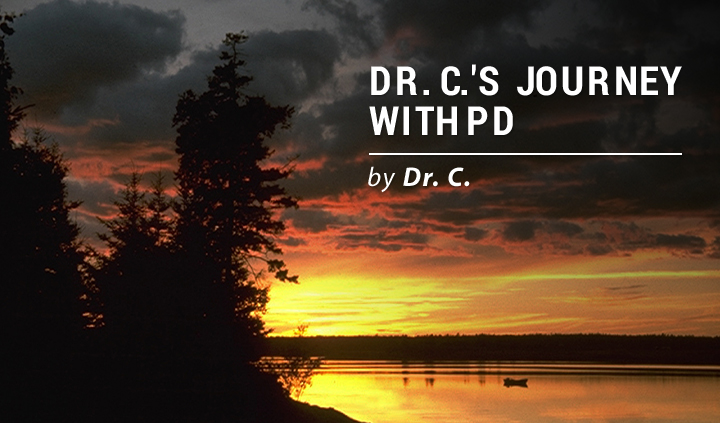The Ruin of a Sedentary Life
Written by |

Wailing, with tears flowing, I cry out, “I feel terrible! I can’t even think straight!” My partner runs over and hugs me hard. I am lost and have nothing left to give.
This is one way that “crossing the threshold” affects my life. It rarely happens — once every five years. It’s the result of things piling on top of things, the old ways of coping no longer working, and stress pushing me over the edge. It began with the ruin of a sedentary life.
It was an ongoing disaster. I had injured muscles while overdoing it in the garden. With rigid Parkinson’s, a muscle injury results in additional spasms and rigidity. Recovery time was weeks, which led to excessive time spent on my computer. I sustained an eye injury in the spring, and I’m still learning to compensate for the resulting vision loss while managing an increase in vertigo and migraines.
A medication adjustment led to further nausea, and a trial on “natural” medication caused an allergic reaction. Due to these stressors, I lost my appetite, which led to weight loss. Was it over? Not quite. I was exposed to a particularly nasty virus that hit me hard. No exercise, poor sleep, and the pressures mentioned led to the ruin of this columnist’s sedentary life.
I know that this situation is not good for me. At the same time, in an almost nonsensical way, I experience resistance to moving away from the situation. It’s easier to do things as I’ve always done them than to change. I realize that the old coping skills, like heavy exercise and gaming, were much easier before Parkinson’s, and less effective now. I experience procrastination; I know that I should take action, but I haven’t.
I am not ruling out ignorance as a cause. I thought that I knew many things about muscle injury recovery, but I had more to learn. I put myself under an unhealthy level of stress to meet what I perceived as important demands on my time. The cruel fact was that I could no longer recover from a muscle injury in the way that I used to. I recognize that I must learn a new way to heal.
I can’t find much scientific research on rigid Parkinson’s and the benefits of exercise on recovery from muscle injury. More education is needed to help those who are trying to maintain an exercise regimen.
I realize that my inattention to the changes that I’m undergoing can place additional burdens on the people around me. I am trying to change my actions and avoid feelings of frustration due to my failure to remember what I cannot do these days. My internal dialog is working with the idea of “out with the old and in with the new me.”
My well-being mantras are as follows:
- If I can’t do it as I did before, then I must put time into learning a new way.
- Vary my exercise regimen. Adjust for recovery from injuries and “off” periods.
- Remember to warm up, stretch, and prepare for any vigorous exercise.
- Keep hydrated. Use the belt attachment to carry my water bottle so that I don’t lose it or forget where it is.
- Take time to recover from any strenuous activity. It used to take a day; now, it can be two or three.
- Think about proper mechanics when carrying out tasks. I must figure out another way to cut down and move trees.
The ruin of a sedentary life was the result of many actions that exacerbated the muscle injury problem rather than contributed to healing. Old ways and familiar mantras don’t work anymore. My muscle rigidity and weakness have jumped another plateau in the progression of this chronic disease, so I must teach myself a new way to exercise. It can’t be business as usual, because the typical strategies aren’t working well anymore.
Now is the time to put the new wellness map into play — every day, with a healthy dose of self-kindness.
I’m developing an information page on exercise with Parkinson’s on my website (www.drc.life). If you would like to contribute to this topic, please let me know in the comments below.
***
Note: Parkinson’s News Today is strictly a news and information website about the disease. It does not provide medical advice, diagnosis or treatment. This content is not intended to be a substitute for professional medical advice, diagnosis, or treatment. Always seek the advice of your physician or another qualified health provider with any questions you may have regarding a medical condition. Never disregard professional medical advice or delay in seeking it because of something you have read on this website. The opinions expressed in this column are not those of Parkinson’s News Today or its parent company, Bionews Services, and are intended to spark discussion about issues pertaining to Parkinson’s disease.



Derek
Learning to slow down is not necessarily in one's genes...that may be a problem. Even though I do not have PD, it is obvious that I cannot undertake projects that I formally did. This, of course, presents a problem, as the problems of life do not diminish with age. How long has this been going on? Why were we not advised of this problem long ago...It seems every generation has to discover this for him/herself...
Dr. C
Hi Derek ~ I looked and couldn't find the original owner's manual issued at birth that covered all the challenges of chronic disease or the advancing years. I think it's a lot of on-the-job training and mentoring. We do the best we can...
Dr. C.
Gavin Mogan
This is really useful stuff, Dr. I’ve never heard such a discussion. I’m dealing with similar circumstances. It’s challenging, but we’ll find our way. I try not to have regret or worry. All we can do is right now, right?
Dr. C
Thanks Gavin, I appreciate your assessment that my columns provide some useful information. My intent is to explore how we work through the Parkinson's symptoms and other chronic diseases on an emotional, psychological and spiritual level. I find it very gratifying that you are of the same mind. Keep up the good work -- you might enjoy the next column coming up.
Dr. C.
Frank R
Thank you for this column. You eloquently and precisely describe my personal situation. Active all my life, my reaction to illness or injury was always "I can exercise through it". Now it's an effort to climb a stair, and motivation is becoming harder to find. Additionally it was a bit of a relief to find I'm not the only one suffering with Rigid Parkinsons. It's hard to convey to others the amount of pain we endure every day (and night). I haven't slept through a full night in so many years I can't recall when it last happened, all due to the pain that awakens me every 60 minutes or so, forcing me to seek a new position in the vain hope that this time I'll be able to sleep. Again, thank you for putting into words the things I've been feeling for a long time. I will definitely be checking your website for further insight and advice.
Dr. C
Hello Frank ~ I very much appreciate your kind words and comments. We have much similarity in our presentation of Parkinson's and the challenges facing us, and others, with the rigidity. This year put a very definite end to strenuous exercise for me. It affected my muscles and tendons with micro-tears in arms and legs. The pain escalated to even higher levels with the damage I sustained on top of the rigidity. I try to share these experiences through my columns, not as a means of complaining, but explaining. If I can express these experiences, and offer them to the community, then that is the greatest gift I can give. I'm glad to know that sharing is helping. Thanks for reading the columns.
Dr. C.
Lindy
Well, there was I Googling as to ways forward with increasing muscle rigidity (in my case, lower limb dystonia) and debating with myself as to whether my chosen, sedentary career as a writer was contributing to the issue. And there you were, Dr C. So, my question to you is, “is a sedentary career likely to make things worse?” Seems to me that you’re one of the few who holds an answer. Kindest, Lindy A
Dr. C
Hi Lindy ~ If you have PD, it is my opinion, and that of many researchers, that exercise is one of the most important things you can do. The second most important action is to decrease stress. If you are a writer, as I am, and enjoy that work, by all means keep doing it! Exercising brain cells is as important as exercising the body. Writers have to get up and move about. I find that physical activity helps me coalesce my thoughts when I return to the chair to put thoughts on paper. I will continue to write about discovering possibilities. Thank you for finding my columns (on Google, no less!) and through the Parkinson's News Today website. I appreciate comments such as yours and they inspire me to keep writing.
Dr. C.